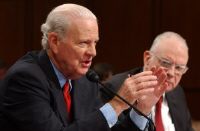 |
| Iraq Study Group Co-Chairmen, former Secretary of State James A. Baker III, left, and former Indiana Rep. Lee Hamilton discuss their group’s report while testifying before the Senate Armed Services Committee on Capitol Hill in Washington on Dec. 7. Photo by Dennis Cook/Associated Press. |
Ben Caspit, journalist from the Maariv newspaper in Israel, holds documentation which shows that the law office of former American secretary of state James Baker earned tens of millions of dollars from a deal it made with the Iraqi government at the peak of the sanctions that were imposed on Saddam Hussein, according to Israeli businessman Nir Gouaz, who was asked by Baker’s office to mediate in the deal.
“I read all the essays about Baker’s vision, about the Baker Report, about the man whom the United States placed at the head of the committee that is to decide on the future of the Middle East, and I decided that there is a limit to chutzpah. The time has come to tell the story,” Gouaz told Ma’ariv this week, explaining his motives for going public.
Here is the essence of the episode. In August 1998, Jeffrey Stonerock, one of the senior partners at Baker Botts, an American law empire directed by former secretary of state James Baker, which specializes in international law, contacted Gouaz. He asked him to help the company collect a debt of approximately a billion dollars owed by the Iraqi government to the Korean company, Hyundai.
Hyundai carried out a series of enormous infrastructure projects in Iraq for an entire decade in exchange for government bonds to be redeemed on various dates. In the wake of the Gulf War, Iraq suspended payments to suppliers, and its debt to the Korean company threatened to topple it.
In order to evade the international boycott of Iraq, and because he is not an American citizen, Gouaz was chosen to mediate the deal. At Baker”s behest, in August 1998 he met with the president of the Bank of Jordan, Shaiker Tawfik Fakoury, who agreed to purchase the Iraqi government bonds in exchange for 30 percent of their value and resell them to the Iraqis at a profit in exchange for oil. For their part, the Iraqis demanded in exchange to raise the quota of oil that they were allowed to export. After several months, and after the quota of oil was raised, the deal got under way.
The Jordanians bought the bonds from Hyundai via Baker’s firm for USD 272 million, and sold them to the Iraqis for USD 450 million dollars’ worth of oil. In Gouaz’s estimation, Baker’s law firm received USD 33 million in fees for services rendered. The deal was completed in July 2000.
Jeffrey Stonerock of Baker’s firm only responded, “your descriptions of our firm’s role during the deal are imprecise.”
©The Bulletin 2006







